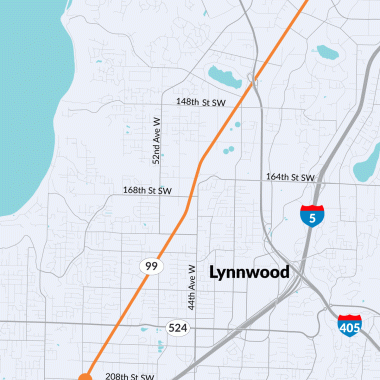The study is needed to make it safer and less stressful for people walking and biking, identify pedestrian and bicycle improvements for the corridor, improve mobility and connectivity for all modes of transportation and identify the vision for the corridor.
Study process
The study will:
- Review existing and future conditions along the SR 99 corridor.
- Develop a purpose and need identifying the concerns the study will be assessing.
- Engage and seek feedback from agency partners, the community and interested parties.
- Develop criteria to evaluate how well improvement concepts and corridor alternatives meet the identified needs.
- Develop and evaluate improvement concepts and corridor alternatives.
- Select study recommendation.
Feedback from the agency partners, community and interested parties is a crucial part of the study process as it ensures that the recommendations developed meet the needs and preferences of the community.
Community engagement
Community engagement is planned throughout the study. Additional information will be shared once available.
Working groups
Technical Working Group (TWG)
The TWG consists of public works, engineering, and planning staff from local, regional, state and tribal entities. The TWG serves in an advisory role to WSDOT providing technical feedback at multiple steps in the study process.
Technical Working Group Meeting 1
Thursday, November 7, 2024
Presentation (PDF 7.6MB)
Summary (PDF 229KB)
Technical Working Group Meeting 2
Thursday, January 9, 2025
Presentation (PDF 9.5MB)
Summary (PDF 201KB)
Executive Advisory Group (EAG)
The EAG consists of elected officials, chairs and executives from local, regional, state, business and tribal entities. The EWG serves in an advisory role to WSDOT providing policy feedback at multiple steps in the study process.
Executive Advisory Group Meeting 1
Friday, November 22, 2024
Presentation (PDF 4.4MB)
Summary (PDF 216KB)
Equity Working Group (EWG)
The EWG consists of representatives from community-based organizations, agencies, and organizations that serve vulnerable populations and overburdened communities along SR 99. The EWG serves in an advisory role to WSDOT providing community feedback at multiple steps in the study process.
Equity Working Group Meeting 1
Thursday, December 5, 2024
Presentation (PDF 5.3MB)
Summary (PDF 152KB)
This corridor study is funded by grants. The Lynnwood segment of the study is made possible by a $800,000 grant award from the Sandy Williams Connecting Communities Grant, a state grant. The unincorporated Snohomish County segment received a federal grant from the Puget Sound Regional Council. The $945,918 Equity grant award has a WSDOT match of $147,613. The total funding for the study is $1,893,531.
The information gathered during the study will help us, in collaboration with our partners and the community, to develop a recommendation for the corridor.

